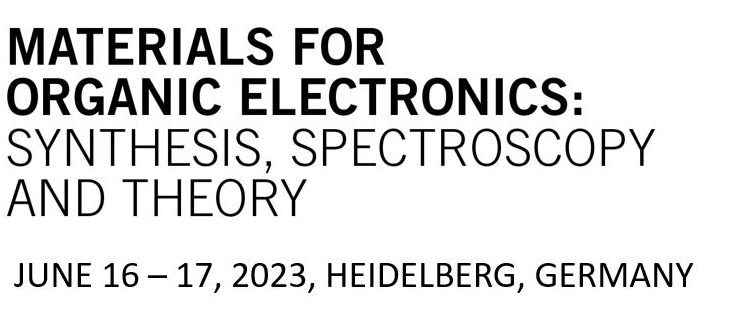Introduction
It is our pleasure to welcome you to the 3rd symposium “Materials for Organic Electronics: Synthesis, Spectroscopy and Theory” held in Heidelberg June 16th – 17th, 2023. This symposium will bring together scientists from all over the world and allow them to present and discuss recent developments in the understanding and application of organic compounds as functional materials and the road map for future materials and technologies.
Scientific Programme
This conference covers a broad range of topics, including the design of novel molecules and extended structures for charge transport and energy conversion, developments in molecular polaritonics, advanced spectroscopy, organic electronic devices (OLED, OPV, OFET), and computational methods to understand organic semiconductors and their properties.
Speakers and Lecture Titles
Eva Blasco, Ruprecht-Karls-Universität Heidelberg
Designing Functional Polymers for 3D and 4D Microprinting
Jochen Blumberger, University College London
Thermo-electricity and Seebeck Coefficient of Organic Crystals from Non-adiabatic Molecular Dynamics
Uwe H. F. Bunz, Ruprecht-Karls-Universität Heidelberg
Unconventional Stabilization of Large Acenes and N-Heteroacenes: Stable Azaheptacenes and Nonacenes
Andreas Dreuw, Ruprecht-Karls-Universität Heidelberg
Computational Analysis and Design of N-Heteropolycycles
Xinliang Feng, Technische Universität Dresden
Graphene Nanostructures 3.0: Nanoelectronics, Quantum Phenomena & Properties
Katharina J. Franke, Freie Universität Berlin
Anchoring molecular adsorbates to S defects on monolayers of MoS2 on Au(111)
Lutz H. Gade, Ruprecht-Karls-Universität Heidelberg
New Functional Dyes Based on a Tetraazaperylene Core
A. Stephen K. Hashmi, Ruprecht-Karls-Universität Heidelberg
Gold Catalysis: A Modular Approach to N-Heteroacenes
Alexander Jan-Christoph Kühne, Universität Ulm
From small molecules to conjugated polymer nanoparticles for organic photonics
David Lidzey, University of Sheffield
Polariton condensation and control of energy landscapes in organic semiconductor microcavities
Franziska Lissel, Leibniz-Institut für Polymerforschung Dresden e. V.
N-Heterocyclic Carbenes (NHCs) as Conductive and Stable Anchors for Au-based Hybrid Materials and Devices
Colin Nuckolls, Columbia University
New Materials for Energy Storage and Conversion
Armido Studer, Westfälische Wilhelms-Universität Münster
Electron Catalysis
Petra Tegeder, Ruprecht-Karls-Universität Heidelberg
Electronic Properties of N-Heteropolycyclic Compounds
Jana Zaumseil, Ruprecht-Karls-Universität Heidelberg
Tuning electronic and optical properties of small-molecule semiconductors by processing and optical cavities
Language
The official language of the symposium will be English.
Supporter
We are very grateful to Deutsche Forschungsgemeinschaft for financial support of this meeting (SFB 1249).
Organising Committee
Lutz H. Gade, Markus Enders (Heidelberg)
